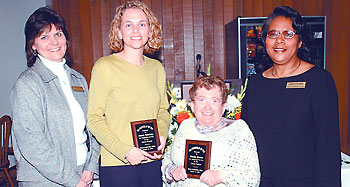WCC volunteers honored for teaching adults to read
By Matt Shaw
Published in News on March 25, 2004 2:05 PM
Ernestine Vann walked gingerly through Wayne Community College's cafeteria and up to the podium. The senior citizen carefully measured each step before taking it.
It would have been a mistake to think of her as frail. When it comes to finally getting the education denied her, she's as hard as a walnut.

News-Argus/Kaye Nesbit
The Wayne Community College Partnership Approach to Literacy presents volunteer of the year awards to Susan Edwards and Rhoda Brown. From left, Karen Burnette, the college's basic skills lab coordinator; Ms. Edwards; Ms. Brown; and Ann Tyner, PAL volunteer coordinator.
"I'm 76 years old and I haven't given up fighting yet," Mrs. Vann told a cheering crowd at the Partnership Approach to Literacy's annual banquet Wednesday night.
Growing up, she didn't have a family pushing her to get an education. She left school without basic reading and math skills.
"People would give me money and I wouldn't know how much they had given me," she said. "They could have cheated me."
She was happy to discover the Basic Skills Programs at the college where she could attend classes for free and improve her skills. Her husband helps by driving her to school and carrying her books.
"Many days I wanted to quit, but I had something inside say, 'Go a little bit further, go a little bit further,'" she said.
Gary Thigpen had a different story but the same drive. He graduated from high school but hadn't taken his studies as seriously as he should have.
"My teachers always told me that I was smart, but I messed around in class," he said.
Later, he realized that he could not read as well as he wanted. Work prevented him from returning to school right away, "but I kept it in my mind, kept it in my heart," he said.
Eventually he was able to return. Now he is reading at a 10th-grade level and is working on his writing.
"By the end of the year I'll be writing letters, and the first person I'll write is Miss Ann," he said, adding sheepishly, "I'll probably write my mom too."
"Miss Ann" is Ann Tyner, the coordinator for the volunteer literacy program that helped lead to these students' success. The program has volunteers who agree to donate two hours a week to work one-on-one with a Basic Skills student for a 16-week semester.
Scheduling is done for the students' and tutors' mutual convenience. "We are flexible and will work around people's vacations and work schedules," she said.
With nearly 2,900 Basic Skills students and only a dozen volunteers, the need for tutors obviously outstrips the supply, Mrs. Tyner said.
But those she has are making a difference, helping "English as a second language" students learn English, helping dropouts finally earn their diplomas and helping laid-off workers re-start their careers.
The Basic Skills students have individual goals. What they typically have in common is the drive to learn, she said.
It's not important for volunteers to have college degrees or teaching experience, she said. A high school diploma is required, but "what they need most is patience, commitment, kindness and the belief that everyone can learn."
The banquet named two people, Rhoda Brown and Susan Edwards, as its volunteers of the year. Mrs. Brown works with English as a second language students 2 1/2 hours a day, four days a week, while Ms. Edwards has enjoyed her service so much that she has thought about returning to school for a degree in education.
Both women have done great work with students, Mrs. Tyner said.
But it wasn't really fair to single them out, she added. "Any of our volunteers could have been volunteer of the year. Every one of you should have been."
The Partnership Approach to Literacy has scheduled volunteer training for April. Anyone interested in knowing more may call Mrs. Tyner at 735-5151, extension 717.
